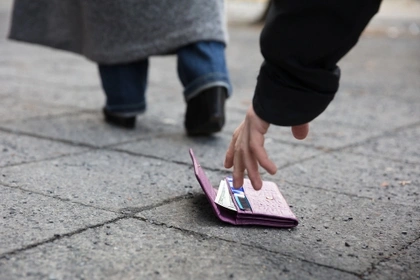Reasons to freeze your credit card
Freezing a credit card means putting a temporary lock on it. This prevents it from being used for new transactions. Credit cards can be frozen for several reasons:
- Lost or stolen cards – to prevent fraudulent use.
- Spending control – to stop yourself from accumulating more debt.
- Financial difficulty – to potentially freeze interest charges as part of a debt plan.
Let’s break these down further.
Freezing a lost or stolen credit card
If your card has been lost or stolen, freezing it can be a smart move. It helps stop unauthorised transactions. Here’s what you need to know:
- Temporary measure: You can freeze your card if you think it’s been misplaced, and unfreeze it if it turns up later.
- Permanent action: If you think it’s truly gone, it’s best to cancel the card and request a new one.
- Purchase protection: Most lenders will cover fraudulent purchases after your card is frozen. That means that you should be refunded for any unauthorised purchases made during this time. Some may charge a £35 fee for transactions made before freezing, depending on your credit agreement.
Freezing a credit card to reduce debt
If you’re feeling overwhelmed by credit card debt, freezing your card can help you focus on paying it down. Here are a few points to consider:
- Stop new purchases: By freezing the card, you prevent new transactions.
- Selective freezes: Some lenders allow you to freeze specific types of transactions, such as; online payments, foreign transactions, payments at tills, contactless payments, and cash withdrawals.
- Breathing Space: This government scheme (available in England and Wales) gives you up to 60 days without any interest, fees or court action. This time is to allow you to make plans to deal with your debt, without any pressure from your lenders.
When banks or providers freeze your card
Sometimes, your card provider may freeze your account, usually for one of two reasons:
-
Suspicious activity: Unusual transactions, such as foreign purchases or large amounts, may trigger a freeze. Let your provider know if you’re planning unusual spending.
-
Persistent debt: If you’ve been in debt for 18 months or longer and most of your repayments are going towards interest and charges, your lender may freeze your account. They will inform you first and offer assistance to help you manage your debt.
Ocean Credit Card
See if it's a YES before you apply
- Up to £8,000 credit limit
- Checking won't affect your credit score
- Get a response in 60 seconds
Intelligent Lending Ltd (credit broker). Capital One is the exclusive lender.

Can you freeze interest on a credit card?
The short answer is yes, but only in certain situations. If you’re struggling financially, get in touch with your lender. They might agree to freeze interest charges as part of a repayment plan.
Be prepared to discuss your spending and financial situation. While interest freezing isn’t guaranteed, lenders are required by the Financial Conduct Authority (FCA) to consider your circumstances fairly.
How to freeze your credit card
-
Understand why you’re freezing the card: Is it to prevent fraud, manage spending, or reduce interest? You may need to explain this to your provider.
-
Gather information: If your card is lost, try to recall the last time you used it. You might find helpful information on your online statement. If you’re freezing your card for debt management purposes, have your financial records ready.
-
Contact your lender: Most providers allow you to freeze your card by phone, online, or via an app. If you bank locally, visiting your branch may also be an option.
Is it bad to freeze your credit card?
Freezing your card won’t directly affect your credit score, as it won’t show up on your credit file. However, if it’s part of a larger issue—like entering a debt management plan—this may affect your credit history.
When can you use your card again after it’s been frozen?
To unfreeze your card:
- If you froze it yourself: Contact your lender via phone, app, or in-branch to request the freeze to be lifted. This may take up to 72 hours to process.
- If your provider froze it: The duration depends on your circumstances. You’ll need to speak to your provider to discuss when and how the freeze can be lifted.
Disclaimer: We make every effort to ensure content is correct when published. Information on this website doesn't constitute financial advice, and we aren't responsible for the content of any external sites.






